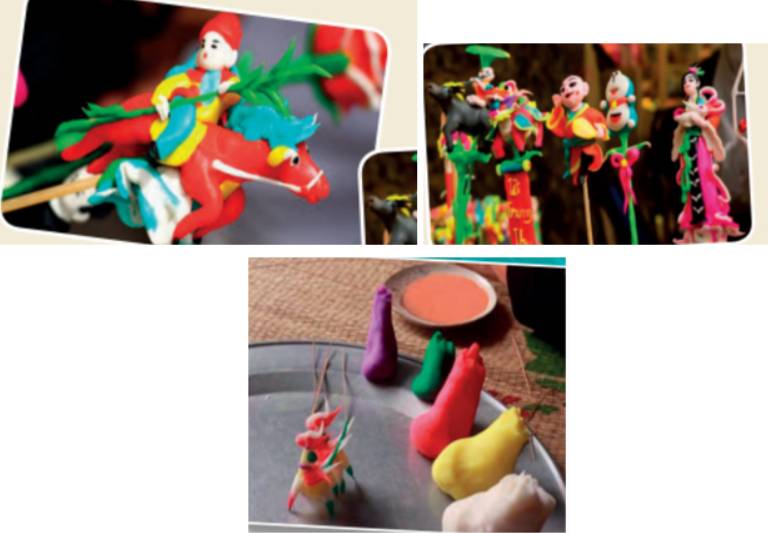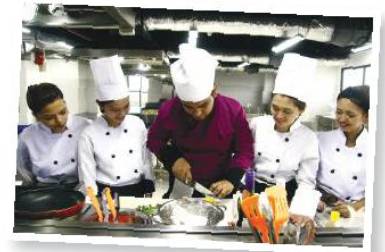
Hãy nhập câu hỏi của bạn vào đây, nếu là tài khoản VIP, bạn sẽ được ưu tiên trả lời.


The pictures show tò he, which is a traditional Vietnamese art form of sculpting edible figurines made from glutinous rice powder. These figurines can be shaped into various forms such as animals, fruits, and flowers, and are often brightly colored.
I usually bought to he at the fairs near my house when I was a child.
(Các bức tranh cho thấy tò he, một loại hình nghệ thuật điêu khắc tượng nhỏ ăn được truyền thống của Việt Nam làm từ bột gạo nếp. Những bức tượng nhỏ này có thể được tạo hình thành nhiều dạng khác nhau như động vật, trái cây và hoa và thường có màu sắc rực rỡ.
Tôi thường mua tò he ở phiên chợ gần nhà khi tôi còn nhỏ.)

1. Which famous people do you look up to?
(Bạn ngưỡng mộ những người nổi tiếng nào?)
2. What kind of behaviour is the most difficult to put up with?
(Loại hành vi nào là khó kiềm chế nhất?)
3. What kind of people do you find it easiest to get on with?
(Bạn thấy thân thiện với kiểu người nào nhất?)
A: Which famous people do you admire?
B: There are many famous people I admire, but I really look up to teacher Nguyen Ngoc Ky. Although he doesn't have hands, he tries to practice writing with his feet. I think it's not an easy thing to do, so that's the reason why I admire him.
A: What kind of behaviour is the most difficult to tolerate?
B: Well, I think that is body shaming. In my opinion each of us is unique and special. So, I think it's rude and I can’t put up with this kind of behaviour.
A: What kind of people do you find it easiest to be friendly with?
B: I like getting on well with those who are good at communicating and thoughtful. Moreover, I like to make friends with hard-working and intelligent people.
Tạm dịch:
A: Bạn ngưỡng mộ những người nổi tiếng nào?
B: Tôi ngưỡng mộ nhiều người nổi tiếng nhưng tôi rất kính trọng thầy Nguyễn Ngọc Ký, dù không có tay nhưng thầy vẫn cố gắng tập viết bằng chân. Tôi nghĩ rằng đó không phải là một điều dễ dàng để làm, vì vậy đó là lý do tại sao tôi ngưỡng mộ thầy ấy.
A: Loại hành vi nào là khó chịu đựng nhất?
B: Chà, tôi nghĩ đó là sự chọc ghẹo về cơ thể. Theo ý kiến của tôi mỗi chúng ta là duy nhất và đặc biệt. Vì vậy, tôi nghĩ điều đó thật thô lỗ và tôi không thể chịu đựng được kiểu hành vi này.
A: Bạn thấy thân thiện với kiểu người nào nhất?
B: Tôi thích hòa hợp với những người giỏi giao tiếp và chu đáo. Hơn nữa, tôi thích kết bạn với những người chăm chỉ và thông minh.

Governments should introduce laws to limit emissions from factories: Chính phủ cần đưa ra các luật để giới hạn lượng chất thải từ các nhà máy.
- Governments also need to invest in renewable energy from solar, wind or water power: Chính phủ cũng cần đầu tư vào các dạng năng lượng tái tạo từ mặt trời, gió và sức nước.
- Governments should widely promote recycling through big campaigns: Chính phủ nên tuyên truyền rộng rãi về sự tái sử dụng qua các chiến dịch lớn.
- Individuals should also try to recycle as much as possible: Mỗi cá nhân cũng cần cố gắng để tái sử dụng nhiều nhất có thể.
- Taking public transport is highly recommended instead of driving: Việc sử dụng các phương tiện công cộng nên được khuyến khích thay vì lái xe cá nhân.
- People should choose products with less packaging: Mọi người nên chọn các sản phẩm có bao bì tối giản để giảm thiểu rác thải và chất thải trong quá trình chế biến.
1. Based on the context of the picture, it seems like the students are taking a vocational course in cooking or culinary arts.
2. It's possible that students may need certain qualifications or prerequisites to apply for this course, such as a high school diploma or previous experience in cooking. However, it ultimately depends on the specific requirements of the course and the institution offering it.
3. Students in this course likely expect to learn various cooking techniques and recipes, as well as gain a deeper understanding of the culinary arts. They may also learn about food safety, kitchen hygiene, and restaurant management if the course covers those topics. Additionally, students may hope to gain hands-on experience in cooking and receive feedback on their dishes from their instructor. Overall, the goal of this course is likely to help students develop their skills and knowledge in the culinary field.

2. I used to listen / didn’t use to listen to stories at bedtime.
(Tôi đã từng nghe / không từng nghe kể chuyện trước khi đi ngủ.)
3. I used to watch / didn’t watch a lot of cartoons.
(Tôi đã từng xem / không từng xem rất nhiều phim hoạt hình.)
4. I used to have / didn’t use to have piano lessons.
(Tôi đã từng / không từng học piano.)
5. I used to walk / didn’t use to walk to school on my own.
(Tôi đã từng đi bộ / không từng tự đi bộ đến trường.)
A: What did you use to do at the age of five?
B: I used to watch a lot of cartoons because that is my favorite kind of TV program. How about you?
A: I didn't use to watch a lot of cartoons.
B: So, what did you use to do when you were five?
A: I used to listen to stories at bedtime. My mom had a lot of interesting stories to tell me.
B: That's cool. Did you used to walk to school?
A: No, my parents used to take me to school everyday.
Tạm dịch:
A: Lúc 5 tuổi bạn đã thường làm gì?
B: Tôi đã từng xem rất nhiều phim hoạt hình vì đó là loại chương trình truyền hình yêu thích của tôi. Còn bạn thì sao?
A: Tôi không thường xem nhiều phim hoạt hình.
B: Vậy, bạn đã từng làm gì khi bạn 5 tuổi?
A: Tôi thường nghe kể chuyện trước khi đi ngủ. Mẹ tôi có rất nhiều câu chuyện thú vị để kể cho tôi nghe.
B: Thật tuyệt. Bạn đã từng để đi bộ đến trường không?
A: Không, bố mẹ tôi từng đưa tôi đến trường hàng ngày.


Solar energy
wind energy